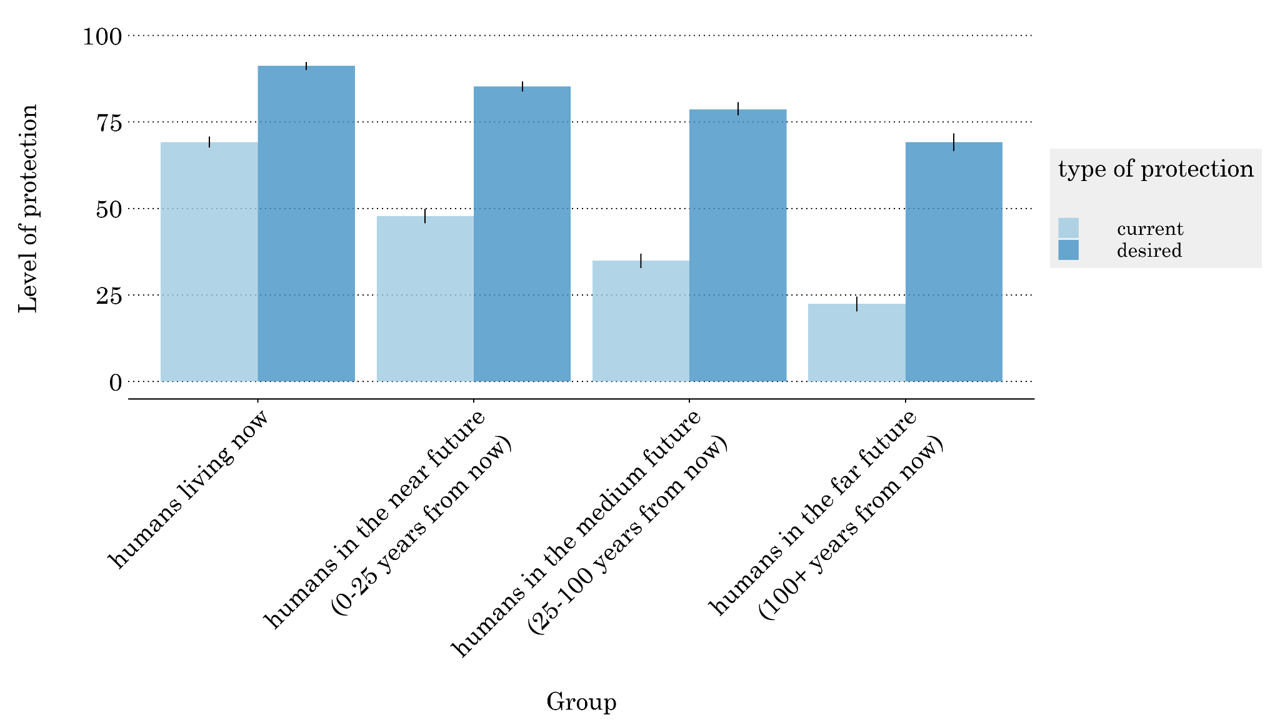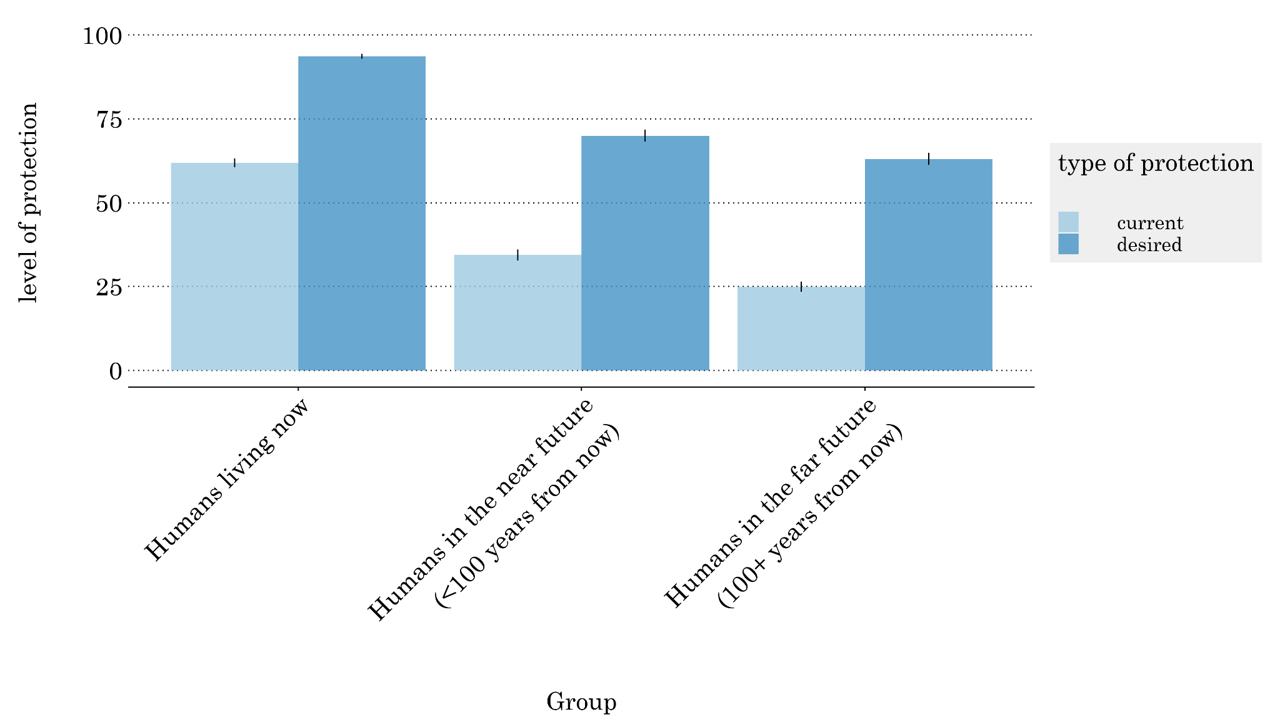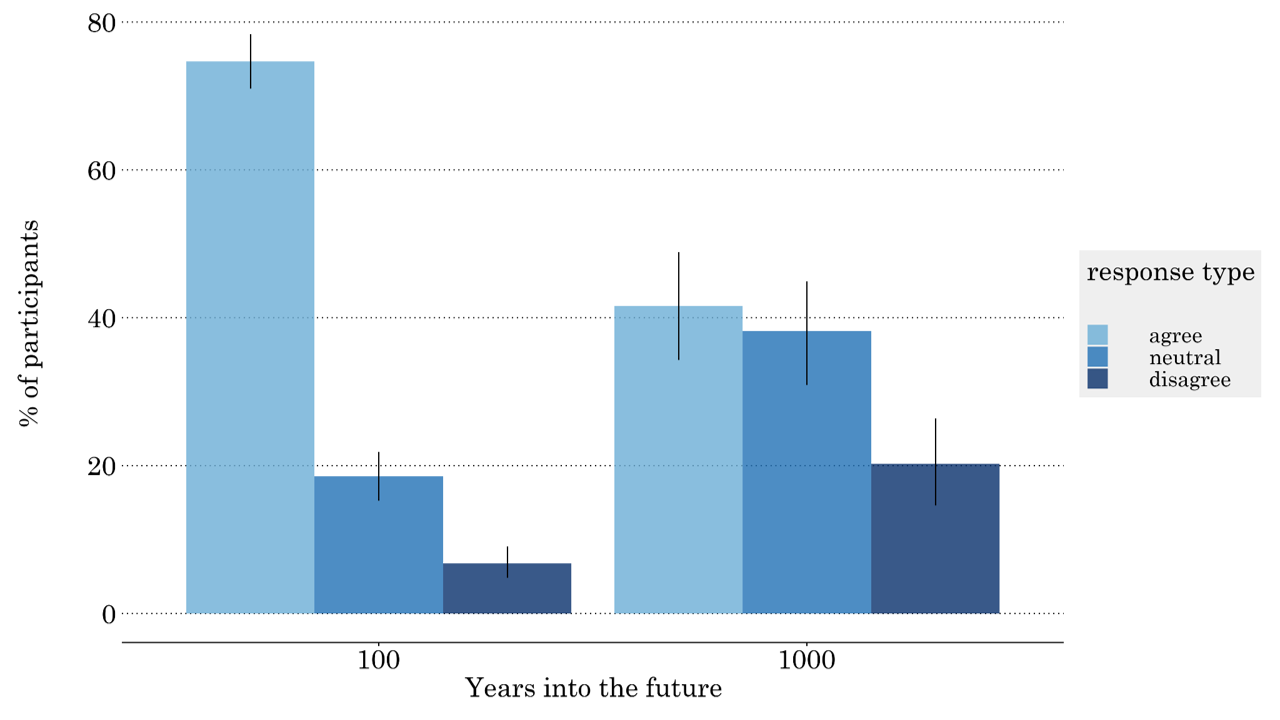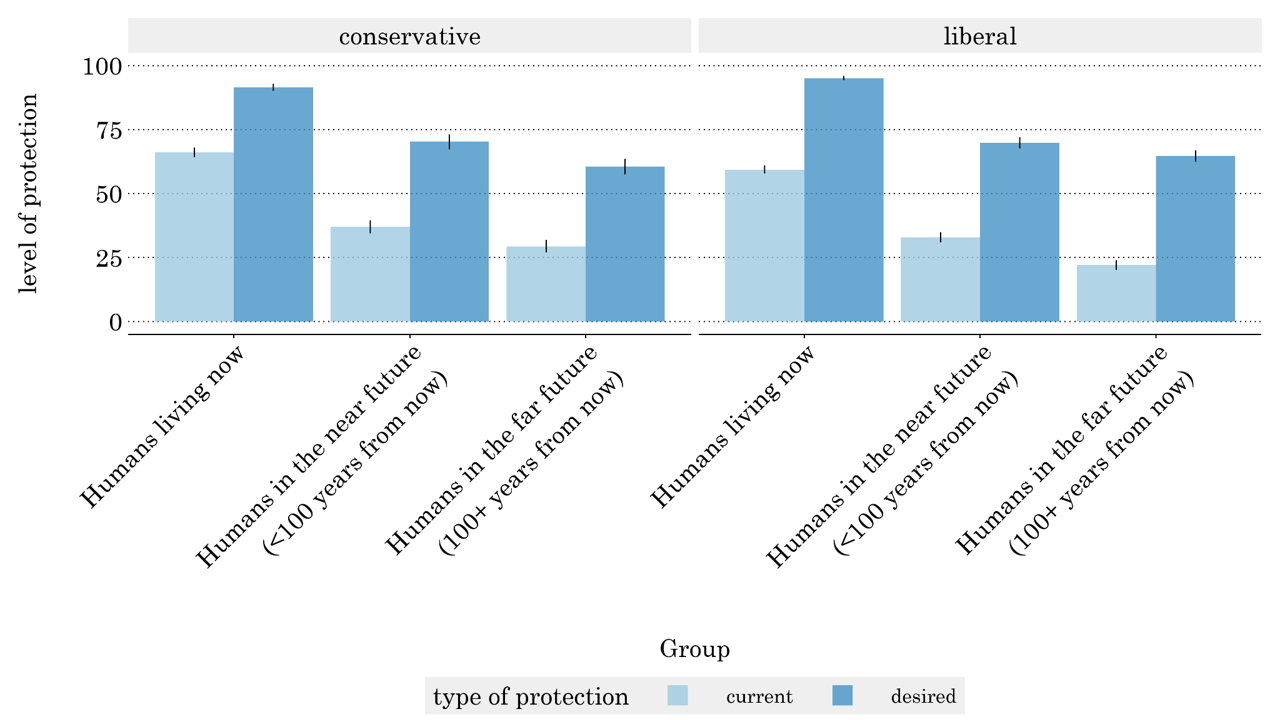Is Legal Longtermism Common Sense?
The past decade has seen a growing interest in protecting future generations from risks associated with climate change, pandemics, artificial intelligence, and other potential threats. Philosophical theories have developed in parallel, and those associated with the view that one should be particularly concerned with ensuring that the long-run future goes well have been referred to as longtermism (MacAskill, 2022). In the context of law, these theories form the basis for legal longtermism, the set of views associated with the claim that law and legal institutions ought to protect the far future (see Martinez & Winter, 2021a; Winter et al., 2021).
An implicit assumption surrounding this work has been that the principles underlying longtermism are not intuitive or widely accepted and, by extension, that one of the principal tasks for legal longtermists is to convince people, and particularly policymakers, of the validity of these principles. However, recent empirical work appears to support the idea that, at least on an abstract level, people do buy into the principles of legal longtermism. In this post, we will briefly present and discuss the implications of three findings in support of this claim, showing that:
- legal experts and laypeople alike believe that the law should protect the long-term future much more than it currently does;
- legal experts believe that the law can predictably and feasibly protect the long-term future; and
- these beliefs hold true across major demographic subgroups.
The evidence comes from a pair of recent empirical studies. In one we surveyed over 500 legal academics from leading universities around the English-speaking world (Martinez & Winter, 2021b), and in the other we surveyed over 1,000 lay adults in the United States (Martinez & Winter, 2021c).
I. The law should do more to protect the far future
The first finding, regarding normative beliefs, found support in both studies. We asked participants about their beliefs regarding the current and desired level of legal protection afforded to future generations and other groups, such as present humans, non-human animals, the environment, and artificial intelligence.
The two prompts were presented to participants as follows:
- On a scale of 0–100, how much does your country’s legal system protect the welfare (broadly understood as the rights, interests, and/or well-being) of the following groups?
- On a scale of 0–100, how much should your country’s legal system protect the welfare (broadly understood as the rights, interests, and/or well-being) of the following groups?
Some of the main results of these studies are visualized in Figures 1 and 2. The main takeaways are threefold. First, the desired level of protection for those living in the far future was roughly two-and-a-half to three times higher than their perceived current level of protection. Second, the desired level of protection for those living in the far future was roughly the same as the perceived current level of protection being afforded to humans living in the present. Third, the gap between the desired and current level of protection is (a) significantly higher for future generations than the present generation; (b) significantly higher for humans living in the far future than the near future; and (c) higher for humans living in the far future than any other group surveyed on, including non-human animals, the environment, artificial intelligence, and humans outside the jurisdiction. Taken together, these results support the claim that legal experts and laypeople alike believe the law should do much more to protect humans living in the long-term future.

Figure 1: Current vs. desired level of legal protection for present and future humans (legal expert survey)

Figure 2: Current vs. desired level of legal protection for present and future humans (laypeople survey)
II. The law can do more to protect the far future
Turning now to the second finding, in the same survey of legal experts, we asked participants whether they believed there are feasible, predictable mechanisms through which the law can affect the long-term future. Needless to say, efforts to provide legal protection may well be deemed futile if the resulting protection proves to be ineffectual. We asked participants about the long-term future (defined as at least 100 years from now) as well as the very long-term future (defined as at least 1000 years from now).
Figure 3 visualizes the main results. For both prompts, significantly more people agreed than disagreed with the claim that law can predictably and feasibly influence the long-term future. The vast majority (74.5%) of participants agreed with respect to the long-term future, while a plurality (40.9%) agreed with respect to the very-long-term future—both striking results given longtermist concerns about cluelessness and washing out (Greaves & Macaskill, 2021; Thorstad, 2021). Participants responded similarly when asked about specific areas of law, such as constitutional, criminal, and environmental law, as well as when asked about specific risks, such as those resulting from artificial intelligence, climate change, and biorisk, suggesting that legal academics view law as a multifaceted and versatile tool to influence the long-term future.

Figure 3: Participant responses to the prompt that there are feasible, predictable legal mechanisms for influencing the future (legal expert survey)
III. We all agree that law can and should do more to protect the long-term future
With regard to the third finding, our studies revealed that these beliefs are held, not only by legal experts and laypeople as a whole, but also by major demographic subgroups. For example, the breakdown of responses to desired vs current level of legal protection among liberal (left) and conservative (right) lay adults is visualized in Figure 4, which shows that main trends identified with regard to laypeople as a whole were also observed in both lay conservatives and lay liberals. Parity was also observed across academic liberals and conservatives, as well as every other demographic category we looked at—including gender, age, country of origin, and type of legal training, whereas similar parity was not as clearly observed with respect to other groups surveyed on. Taken together, these findings reveal widespread agreement with the premises that (a) law can do more to protect the long-term future and (b) law should do more to protect the long-term future. In other words, these findings support the claim that legal longtermism is common sense.

Figure 4: Current vs desired protection for present and future humans by political affiliation.
IV. What’s next?
As noted at the outset, contrary to what is often assumed or taken for granted, there seems to be strong support for legal longtermism. By extension, one possible takeaway is that the goal of legal longtermists should not be so much to convince people of the validity of the abstract principles of legal longtermism but to transform those principles which they already deem to be valid into concrete action and, ultimately, effective legal policy.
While this goal may currently seem far-fetched given the novelty of longtermism as a theory and the lack of de facto legal protection provided to future generations in modern legal systems, policymakers have already begun to provide de jure protection to future generations, particularly at the constitutional level. For example, recent work by Araújo & Koessler (2021) found that constitutions referencing future generations now comprise roughly one-third of all constitutions in force. Although most of these reference future generations alongside or in the context of environmental protection (62%) and natural resources (35%), some constitutions (22%) mention future generations stricto sensu, by themselves without another theme mentioned, suggesting that at least some principles of legal longtermism are becoming commonsensical, not only to the global citizenry but also to policy-makers at the highest level.
Future empirical work could seek to determine how best to enshrine these principles in law so as to most effectively protect the long-term future given the limitations of human cognition. Previous work has identified various cognitive biases and heuristics that could plausibly interfere with humans’ ability to reason about the long-term future, particularly with regard to existential and other catastrophic risks (Yudkowsky, 2008; Schubert et al., 2019).
Many of these biases and heuristics could similarly impede laws and policies to protect the long-term future, including (a) the conjunction fallacy–the erroneous tendency to infer that a conjoint set of two or more conclusions is likelier than a single member of that same set (Tversky & Kahneman, 1983); (b) present bias and hyperbolic discounting, the tendency to overvalue immediate rewards and undervalue long-term consequences (e.g. O’Donoghue & Rabin 2015); (c) scope insensitivity, the inability to value a problem with a multiplicative relationship to its size (e.g. Slovic, 2013); and (d) the availability heuristic, the tendency to heavily weigh judgments based on information that is available and/or can be readily recalled (Tversky & Kahneman, 1973). These biases may particularly manifest themselves in contexts that require reasoning about existential risk, as it encompasses the present through the far future, people and life on a vast scale, and threats that are probabilistic in nature and have not yet materialized to be in the present consciousness.
Given that law is ultimately made and interpreted by humans, and humans—including policymakers and legal experts—are susceptible to various biases that may interfere with their preference to protect the long-term, future laws, policies, and institutions should be designed to account for these biases. There are few causes with as broad agreement across demographic subgroups as the longtermist principles included in our study, suggesting that legal longtermism is not merely an esoteric philosophy but rather a democratic mandate.
Bibliography
R. Araújo, L. Koessler, The Rise of the Constitutional Protection of Future Generations, Legal Priorities Project Working Paper Series No. 7, September 2021, https://dx.doi.org/10.2139/ssrn.3933683
H. Greaves, W. MacAskill, The Case for Strong Longtermism, Global Priorities Institute Working Paper No. 5-2021, June 2021, https://globalprioritiesinstitute.org/wp-content/uploads/The-Case-for-Strong-Longtermism-GPI-Working-Paper-June-2021-2-2.pdf
W. MacAskill, What We Owe the Future (forthcoming 2022)
E. Martínez, C. Winter, Experimental Longtermist Jurisprudence, in S. Magen, K. Prochownik (Eds.), Advances in Experimental Philosophy of Law (forthcoming), https://ssrn.com/abstract=3933618
E. Martínez, C. Winter, Protecting Future Generations: A Global Survey of Legal Academics, Legal Priorities Project Working Paper Series No. 1, February 2022, https://dx.doi.org/10.2139/ssrn.3931304
E. Martínez, C. Winter, Protecting Sentient Artificial Intelligence: A Survey of Lay Intuitions on Standing, Personhood, and General Legal Protection, Frontiers in Robotics and AI, November 2021, https://doi.org/10.3389/frobt.2021.788355
T. O’Donoghue, M. Rabin, Present Bias: Lessons Learned and to Be Learned, American Economic Review, Volume 105, Issue 5, May 2015, pp. 273 – 279, https://doi.org/10.1257/aer.p20151085
S. Schubert, L. Caviola, N. S. Faber, The Psychology of Existential Risk: Moral Judgments About Human Extinction, Scientific Reports, Volume 9, Article Number 15100, 2019, https://doi.org/10.1038/s41598-019-50145-9
P. Slovic et al., Psychic Numbing and Mass Atrocity, in E. Shafir (Ed.), The Behavioral Foundations of Public Policy (2013), pp. 126 – 142, https://doi.org/10.1515/9781400845347-011
D. Thorstad, The Scope of Longtermism, Global Priorities Institute Working Paper No. 6-2021, June 2021, https://globalprioritiesinstitute.org/wp-content/uploads/Scope-Longtermism.pdf
A. Tversky, D. Kahneman, Availability: A Heuristic for Judging Frequency and Probability, Cognitive Psychology, Volume 5, Issue 2, September 1973, pp. 207 – 232, https://doi.org/10.1016/0010-0285(73)90033-9
A. Tversky, D. Kahneman, Extensional Versus Intuitive Reasoning: The Conjunction Fallacy in Probability Judgment, Psychological Review, Volume 90, Issue 4, 1983, pp. 293 – 315, https://doi.org/10.1037/0033-295X.90.4.293
C. Winter et al., Legal Priorities Research: A Research Agenda, Legal Priorities Project, January 2021, https://www.legalpriorities.org/research_agenda.pdf
E. Yudkowsky, Cognitive Biases Potentially Affecting Judgment of Global Risks, in N. Bostrom, M. M. Cirkovic, M. J. Rees (Eds.), Global Catastrophic Risks (2008), pp. 91 – 119, https://doi.org/10.1093/oso/9780198570509.003.0009




I’m fundamentally sceptical about any theory trying to tackle “long term” issues in a legal manner mainly because of two reasons.
(1) The foreseeability of future events and their legal and political ramifications -especially in the domain of climate change we are talking about a complex, non-linear phenomenon with inherently limited predictability that is linked to human interference, making it even more unpredictable. There is no guarantee that policies that eventually turn into legal norms aren’t going to have any adverse effects or even be detrimental to future events. This limited predictability also causes problems with possible legal sanctions. If you can not provide solid criteria for what is to constitute a violation of “securing the future”, you as a legislator are mostly limited to mission statements with very limited scope of adjudicability. Like Art. 20a of the German Constitution. Even more foreseeable events, like floods or hurricanes, aren’t as foreseeable enough to be able to create a general norm with regards to culpability even in terms of neglect.
(2) Continuity in public opinion – this is not in regards to climate change and other ecological catastrophes but to other issues that are mostly of a moral and ethical nature. Using the law to “protect the future” presupposes that future sensibilities with regards to certain topics will stay the same. History has taught us that that is not necessarily the case. Legal theorists have pondered for years about the fact that law has an inherent “cultural lag” – social acceptability usually comes before legal codification. Recent examples of this are the views on homosexual relationships or legalization of drugs. I’m pretty sure societal views on what constitutes a “basis for future generations” are as much a topic of societal change as the aforementioned issues.
Most statements in regards to laws function for future generations are usually activist staments without much analytical substance to them. I’d argue that law in general is a fundamentally retrospective discipline because if you are to measure events with regards to legal standards you need to be able to piece together how they came to be. If you are able to do this with regards to the future you are not a jurist but a clairvoyant.